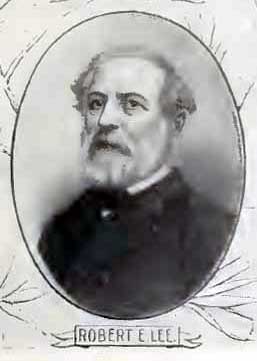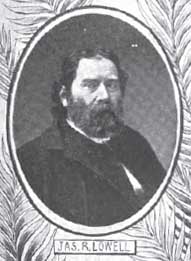|
BIOGRAPHIES
Source:
Genealogical & Biographical Record
of Miami Co., Ohio
Chicago: The Lewis Publishing Company
1900
< CLICK HERE TO RETURN TO
BIOGRAPHICAL INDEX of History Publ. 1900 >
< CLICK HERE to RETURN to
LIST of BIOGRAPHICAL INDEXES >
| |
MELVILLE O. LANDON,
better known as " Eli Perkins," author, lecturer and
humorist, was born in Eaton, New York, Sept, 7, 1839. He was
the son of John Landon and grandson of Rufus
Landon, a revolutionary soldier from Litchfield county,
Connecticut. Melville was educated at the district school and
neighboring academy, where he was prepared for the sophomore class
at Madison University. He passed two years at the latter, when
he was admitted to Union College, and graduated in the class of
1861, receiving the degree of A. M., in 1862. He was, at once,
appointed to a position in the treasury department at Washington.
This being about the time of the breaking out of the war, and before
the appearance of any Union troops at the capital, he assisted in
the organization of the "Clay Battalion," of Washington.
Leaving his clerkship some time later, he took up duties on the
staff of General A. L. Chetlain, who was in command at
Memphis. In 1864 he resigned from the army and engaged in
cotton planting in Arkansas and Louisiana. In 1867 he went
abroad, making the tour of Europe, traversing Russia. While in the
latter country his old commander of the "Clay Battalion," General
Cassius M. Clay, then United States minister at St. Petersburg,
made him secretary of legation. In 1871, on returning to
America, he published a history of the Franco-Prussian war, and
followed it with numerous humorous writings for the public press
under the name of "Eli Perkins," which, with his
regular contributions to the "Commercial Advertiser," brought him
into notice, and spread his reputation as a humorist throughout the
country. He also published "Saratoga in 1891," "Wit, Humor and
Pathos," "Wit and Humor of the Age," "Kings of Platform and Pulpit,"
"Thirty Years of it and Humor," " Fun and Fact," and " China and
Japan."
Source: Genealogical & Biographical Record
of Miami Co., Ohio - Chicago: The Lewis Publishing Company - 1900 - Page
109 |
| |
DAVID L. LEE.
David L. Lee, one of the enterprising and prosperous business
men of Troy, is numbered among Miami county's native sons, his birth
having here occurred on the 17th of December, 1843. His
father, Abram J. Lee, was born in Virginia, in 1809, and at
an early period in the development of Miami county came to Ohio with
his father, Benjamin Lee, who was a first cousin of
General Robert E. Lee, of Confederate fame. Our subject
has the same refined and intellectual face, calm and dignified, yet
with his penetrating expression, as his illustrious cousin.
Benjamin Lee located on a farm on Honey creek, and there
reared his family. Abram J. Lee was identified with the
agricultural interests of this community in pioneer times, and after
arriving at years of maturity he purchased a farm on the Dayton
pike, near Troy, now known as the Enyeart farm.
He married Catherine Bowersock, a representative of an
old Pennsylvania family. The children of this marriage are:
J. H., who is now in the Klondike; George, a hardware
merchant of Piqua, Ohio; Howard, a retired farmer of Kansas;
Mrs. G. L. Smith, who resided in St. Paris, but is now
deceased; and Davis L., of this review. George
and Howard were both loyal soldiers in the Union army during
the civil war.
The father of this family died when David L. Lee
was only six years of age. The family afterward removed to
Fletcher, where he attended school and also worked on the home farm.
At the outbreak of the war of the rebellion, although only seventeen
years of age, he was one of the first to respond to the call for
troops, enlisting in the Seventy-first Ohio Infantry. After
participating in the battle of Pittsburg Landing, he was engaged in
garrison duty in Tennessee and in fighting guerrillas. In 1864
he re-enlisted and after joining General Sherman's
army at Cumberland, he took part in the Atlanta campaign, and was
present at the fall of Atlanta. His command was with
General Thomas, of the Fourth Army Corps, at the battles of
Pulaski, Columbia, Franklin and Nashville. At the last named
place Hood's army was annihilated and was thus prevented from
making the contemplated raid into Ohio. On the 15th and i6th
of December, when General Thomas rode down the line.
Mr. Lee states that every man felt that victory had
crowned the Union arms. Nashville was the last battle in which
Mr. Lee participated, for, by the last gun fired by
the rebels, he had his left leg shattered and the member was
afterward amputated. For two months he lay in the Nashville
hospital and then returned to his home.
On again reaching the north Mr. Lee
learned the silversmith's trade, at which he worked for two years,
when, on the 3rd of July, 1867, he was appointed United States
storekeeper at Hayner's distillery, in Troy. He held that
position for six years, and in the fall of 1873 was elected sheriff
of Miami county, and re-elected in 1875, acceptably serving in that
capacity for four consecutive years. He handled three hundred
and fifty prisoners, took fifty criminals to the penitentiary at
Columbus and a number of offenders to the Lancaster Farm for Boys
and to the Reformed Home for Girls. Two indictments were
returned for murder in the first degree, but the convictions were in
the second degree so that he narrowly escaped being compelled to
hang the murderers. Only one person thus far has been hung in
Miami county, and that was by the sheriff succeeding Mr.
Lee. In 1878 our subject went to Kansas City, Missouri,
but his business ventures there proved unprofitable, and in 1880 he
returned to Troy. Not long afterward he went to Arizona to
visit a brother, and while in that territory acted as a clerk in the
twelfth Arizona legislature for one term. On again coming to
Troy he went into the grocery business, and, while so engaged, was
once more appointed storekeeper and gauger by President
Harrison for a term of four years. Under Cleveland
he was superseded in the office, but was twice elected township
clerk for terms of two years each, and during his incumbency in that
position he was reappointed storekeeper and ganger at Hayner's
distillery, in
which position he is now serving.
Mr. Lee was married in Troy, Oct. 8, 1868, to
Miss Libby C. Clyde, a daughter of George C. Clyde, now
deceased. Her father, a prominent and influential citizen of
the community, served for two terms as treasurer of Miami county, as
auditor for two terms and as a member of the state legislature.
Mr. and Mrs. Lee now have two sons,
Harry and Fred, the former an inspector for the Central
Union Telephone Company, of Troy, and the latter a clerk in
Long & McKnight's store, in Troy. The family are
members of the Presbyterian church, and Mr. Lee holds
membership relations with the Knights of Pythias fraternity.
Coleman Post, G. A. R., and the Independent Order of Odd Fellows.
He has filled various offices in those organizations, and at the
present time is serving as treasurer of the first two. He has
a fine home on North Mulberry street, which he has gained by his own
well directed efforts in business affairs. Many times called
to public office, his career has ever been honorable and loyal, and
no trust reposed in him has ever been betrayed.
Source: Genealogical & Biographical Record
of Miami Co., Ohio - Chicago: The Lewis Publishing Company - 1900 - Page
843 |

ROBERT E. LEE |
GENERAL ROBERT EDWARD LEE,
one of the most conspicuous Confederate generals during the
Civil war, and one of the ablest military commanders of
modern times, was born at Stratford House,
Westmoreland county, Virginia, Jan. 19, 1807. In 1825
he entered the West Point academy and was graduated second
in his class in 1829, and attached to the army as second
lieutenant of engineers. For a number of years he was
thus engaged in engineering work, aiding in establishing the
boundary line between Ohio and Michigan, and superintended
various river and harbor improvements, becoming captain of
engineers in 1838. He first saw field service in the
Mexican war, and under General Scott performed
valuable and efficient service. In that brilliant
campaign he was conspicuous for professional ability as well
as gallant and meritorious conduct, winning in quick
succession the brevets of major, lieutenant colonel, and
colonel for his part in the battles of Cerro Gordo,
Contreras, Cherubusco, Chapultepec, and in the capture of
the city Mexico. At the close of that war he resumed
his engineering work in connection with defences along the
Atlantic coast, and from 1852 to 1855 was superintendent of
the Military Academy, a position which he gave up to become
lieutenant-colonel of the Second Cavalry. For several
years thereafter he served on the Texas border, but
happening to be near Washington at the time of John
Brown's raid, October 17 to 25, 1859, Colonel
Lee was placed in command of the Federal forces
employed in its repression. He soon returned to his
regiment in Texas where he remained the greater part of
1860, and Mar. 16, 1861, became colonel of his regiment by
regular promotion. Three weeks later, April 25, he
resigned upon the secession of Virginia, went at once to
Richmond and tendered his services to the governor of that
state, being by acclamation appointed commander-in-chief of
its military and naval forces, with the rank of
major-general.
He at once set to work to organize and develop the
defensive resources of his state and within a month directed
the occupation in force of Manassas Junction.
Meanwhile Virginia having entered the confederacy and
Richmond become the capitol, Lee became one of the
foremost of its military officers and was closely connected
with Jefferson Davis in planning the moves of that
tragic time. Lee participated in many of the hardest fought
battles of the war among which were Fair Oaks, White Lake
Swamps, Cold Harbor, and the Chickahominy, Manassas, Cedar
Run, Antietam, Fredericksburg, Chancellorsville, Malvern
Hill, Gettysburg, the battles of the Wilderness campaign,
all the campaigns about Richmond, Petersburg, Five Forks,
and others. Lee's surrender at Appomatox
brought the war to a close. It is said of General
Lee that but few commanders in history have been so
quick to detect the purposes of an opponent or so quick to
act upon it. Never surpassed, if ever equaled, in the art of
winning the passionate, personal love and admiration of his
troops, he acquired and held an influence over his army to
the very last, founded upon a supreme trust in his judgment,
prescience and skill, coupled with his cool, stable, equable
courage. A great writer has said of him: As regards
the proper measure of General Lee's rank among
the soldiers of history, seeing what he wrought with such
resources as he had, under all the disadvantages that ever
attended his operations, it is impossible to measure what he
might have achieved in campaigns and battles with resources
at his own disposition equal to those against which he
invariably contended."
Left at the close of the war without estate or
profession, he accepted the presidency of Washington College
at Lexington, Virginia, where he died Oct. 12, 1870.
Source: Genealogical & Biographical Record
of Miami Co., Ohio - Chicago: The Lewis Publishing Company - 1900 - Page
38 |

JAS. R. LOWELL |
|
NOTES:
|
![]()
![]()


